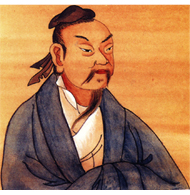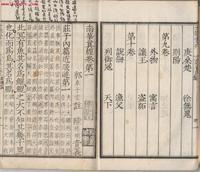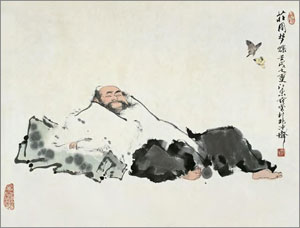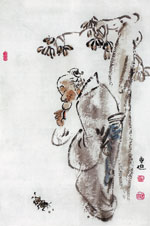
Life
Zhuangzi allegedly lived during the reign of King Hui of Liang and King Xuan of Qi, in the span from 370 to 301 BCE. Zhuangzi was from the Town of Meng (蒙城, Méng Chéng) in the State of Song (now Shāngqiū 商邱, Henan). His given name was Zhou (周, Zhōu). He was also known as Meng Official, Meng Zhuang, and Meng Elder (蒙吏, Méng Lì; 蒙莊, Méng Zhuāng, and 蒙叟, Méng sǒu, respectively).
Zhuangzi’s philosophy
In general, Zhuangzi’s philosophy is mildly skeptical, arguing that our life is limited and the amount of things to know is unlimited. To use the limited to pursue the unlimited, he said, was foolish. Our language and cognition in general presuppose a dao to which each of us is committed by our separate past—our paths. Consequently, we should be aware that our most carefully considered conclusions might seem misguided had we experienced a different past. “Our heart-minds are completed along with our bodies.” Natural dispositions to behavior combine with acquired ones—including dispositions to use names of things, to approve/disapprove based on those names and to act in accordance to the embodied standards. Thinking about and choosing our next step down our dao or path is conditioned by this unique set of natural acquisitions.

Zhuangzi’s thought can also be considered a precursor of relativism in systems of value. His relativism even leads him to doubt the basis of pragmatic arguments (that a course of action preserves our lives) since this presupposes that life is good and death bad. In the fourth section of “The Great Happiness” (至樂 zhìlè, chapter 18), Zhuangzi expresses pity to a skull he sees lying at the side of the road. Zhuangzi laments that the skull is now dead, but the skull retorts, “How do you know it’s bad to be dead?”
Another example about two famous courtesans points out that there is no universally objective standard for beauty. This is taken from Chapter 2 (齊物論 qí wù lùn) “On Arranging Things”, or “Discussion of Setting Things Right” or, in Burton Watson’s translation, “Discussion on Making All Things Equal”.
Men claim that Mao [Qiang] and Lady Li were beautiful, but if fish saw them they would dive to the bottom of the stream; if birds saw them they would fly away, and if deer saw them they would break into a run. Of these four, who knows how to fix the standard of beauty in the world? (2, tr. Watson 1968:46)
However, this subjectivism is balanced by a kind of sensitive holism in the conclusion of the section called “The Happiness of Fish” (魚之樂, yúzhīlè). The names have been changed to pinyin romanization for consistency:
Zhuangzi and Huizi were strolling along the dam of the Hao Waterfall when Zhuangzi said, “See how the minnows come out and dart around where they please! That’s what fish really enjoy!”
Huizi said, “You’re not a fish — how do you know what fish enjoy?”
Zhuangzi said, “You’re not I, so how do you know I don’t know what fish enjoy?”
Huizi said, “I’m not you, so I certainly don’t know what you know. On the other hand, you’re certainly not a fish — so that still proves you don’t know what fish enjoy!”
Zhuangzi said, “Let’s go back to your original question, please. You asked me how I know what fish enjoy — so you already knew I knew it when you asked the question. I know it by standing here beside the Hao.” (17, tr. Watson 1968:188-9)

Another well-known part of the book, which is also found in Chapter 2, is usually called “Zhuangzi dreamed he was a butterfly” (莊周夢蝶 Zhuāng Zhōu mèng dié). Again, the names have been changed to pinyin romanization for consistency:
Once Zhuangzi dreamt he was a butterfly, a butterfly flitting and fluttering around, happy with himself and doing as he pleased. He didn’t know he was Zhuangzi. Suddenly he woke up and there he was, solid and unmistakable Zhuangzi. But he didn’t know if he was Zhuangzi who had dreamt he was a butterfly, or a butterfly dreaming he was Zhuangzi. Between Zhuangzi and a butterfly there must be some distinction! This is called the Transformation of Things. (2, tr. Burton Watson 1968:49)
This hints at many questions in the philosophy of mind, philosophy of language, and epistemology. The name of the passage has become a common Chinese idiom, and has spread into Western languages as well. It appears, inter alia, as an illustration in Jorge Luis Borges’ famous essay “A New Refutation of Time”, and may have inspired H. P. Lovecraft’s 1918 short story “Polaris”.
Zhuangzi’s philosophy was very influential in the development of Chinese Buddhism, especially Chán (also known as Zen).

Anarchy
According to Murray Rothbard, Zhuangzi was “perhaps the world’s first anarchist”; Zhuangzi said, the world “does not need governing; in fact it should not be governed,” and, “Good order results spontaneously when things are let alone.” Rothbard claims that Zhuangzi was the first to work out the idea of spontaneous order, before Proudhon and Hayek.[1]
Alan Watts, who in his mature and later years was sympathetic to minarchical libertarianism, declared that Zhuangzi was a libertarian
Evolution
In Chapter 18, Zhuangzi also mentions life forms have an innate ability or power (機) to transform and adapt to their surroundings. While his ideas don’t give any solid proof or mechanism of change such as Alfred Wallace and Charles Darwin, his idea about the transformation of life from simple to more complex forms is along the same line of thought. Zhuangzi further mentioned that humans are also subject to this process as humans are a part of nature.




